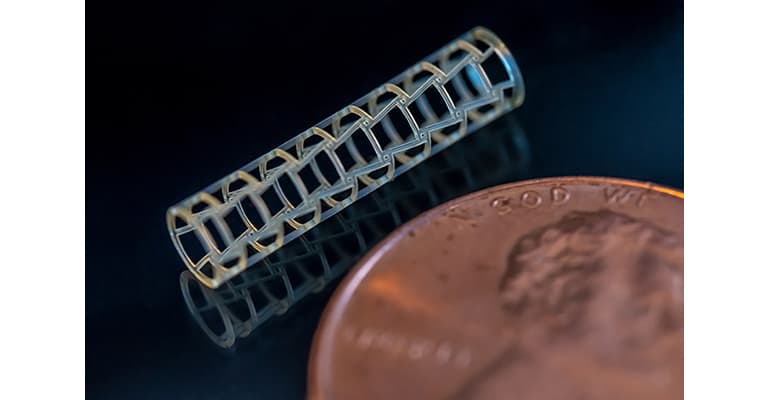The breakthrough from Boston Micro Fabrication and 4D Biomaterials is said to enable medical device companies to think about 3D printing micro bioresorbable implants for the first time.
3D-printing equipment maker Boston Micro Fabrication (BMF) and UK-based 3D-printing materials company 4D Biomaterials announce that they have achieved the capability of printing micro-scale geometries using 4Degra bioresorbable materials. Reportedly the first time a bioresorbable material has been printed using this process, the technology has the potential to revolutionize the way implantable medical devices are manufactured. Miniature rigid orthopedic devices and micro-scale soft-tissue applications are cited by the companies as early opportunities.
The partnership combines BMF’s projection micro-stereolithography (PµSL) approach with 4D Biomaterials’ 4Degra resin inks. The inks are based on polycarbonate urethane chemistry and can be printed via PμSL and digital light processing to create finely detailed implantable medical devices that support the body’s natural healing processes before degrading into harmless by-products that are absorbed and removed through normal metabolic processes. The chemistry can be tuned so that the 3D-printed product exhibits a range of mechanical properties.
Eliminating barriers in miniaturization of medical devices
BMF’s microArch system leverages light, customizable optics, a high-quality movement platform, and controlled processing technology to produce what it claims is the industry’s most accurate and precise high-resolution 3D prints for product development, research, and industrial short-run production. The company’s PµSL technology has attracted a growing group of customers who are working to develop new micro-scale medical devices. “Our customers continue to seek out solutions to miniaturize, and now with bioresorbable material options, a whole new range of devices is possible,” said BMF CEO John Kawola in a prepared statement. “Miniaturization in medical device development has been held back by the limitations of traditional manufacturing methods and the materials available. The BMF and 4D Biomaterials partnership is working toward eliminating those barriers.”
Bioresorbable polymers market to reach $1.6 billion by 2026
The partnership is enabling medical device companies to think about 3D printing micro-resorbable implants for the first time, added Philip Smith, CEO of 4D Biomaterials, a spin out from the universities of Birmingham and Warwick capitalizing on 15 years of academic research. The bioresorbable polymers market is estimated to be $1 billion in 2021 and is projected to reach $1.6 billion by 2026, according to a business report from Markets and Markets. “We are already seeing the demand from this market growth as the range of applications continues to widen with the advancements in hardware, software, and materials technology,” said Smith.


